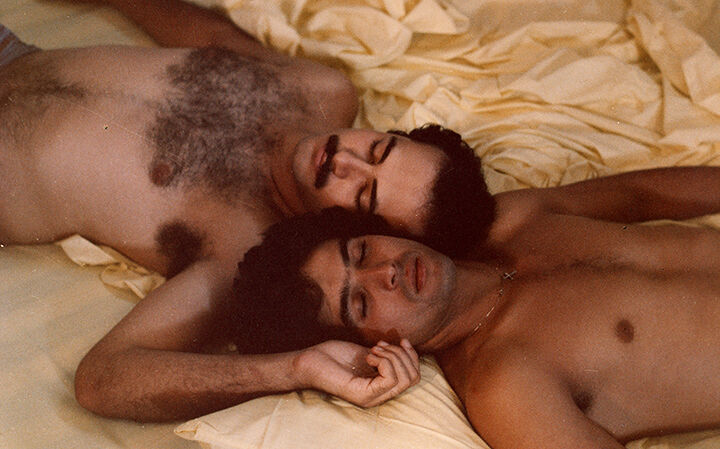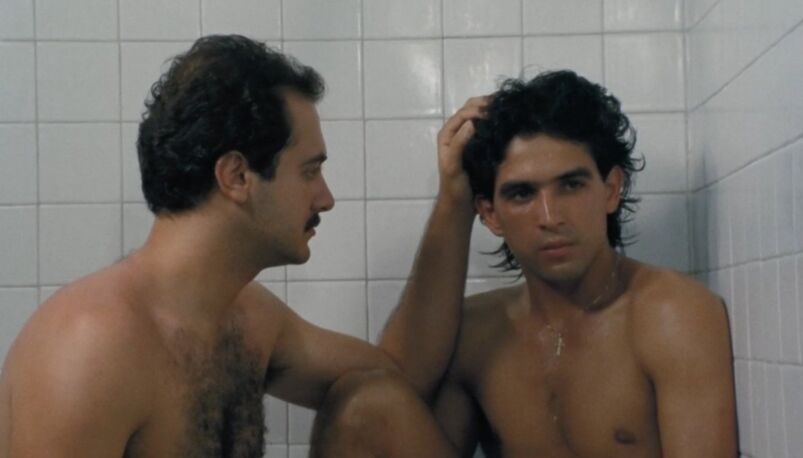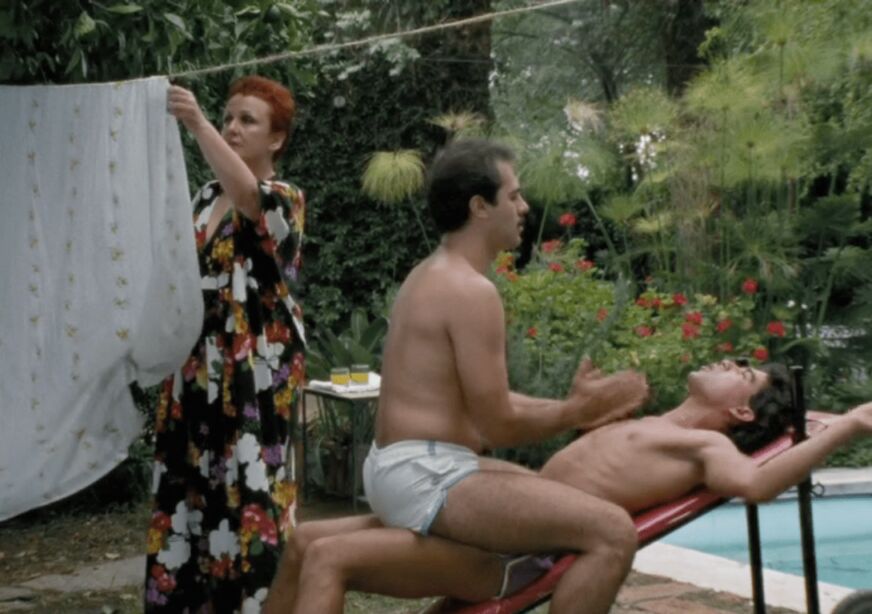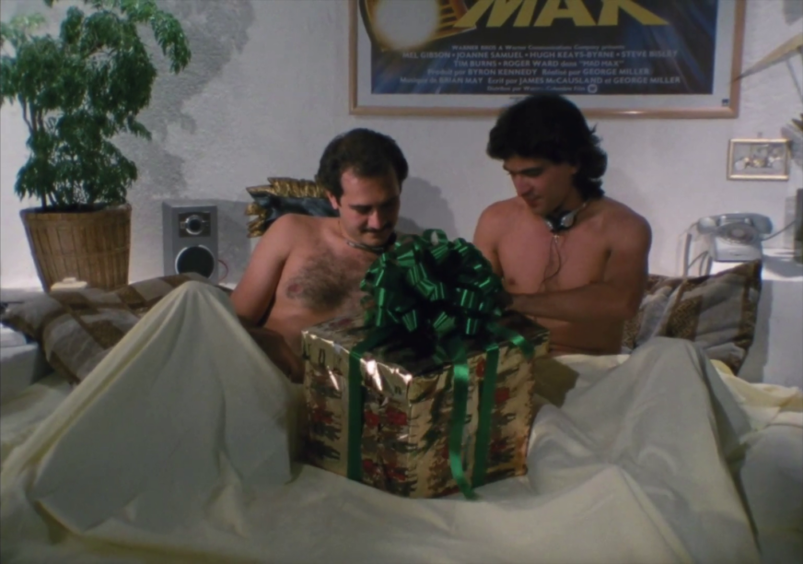
Welcome back to our queer film retrospective, “A Gay Old Time.” In this week’s column, we revisit 1985’s Doña Herlinda And Her Son, the first Mexican film to center an openly LGBTQ+ couple.
It hasn’t been that long since the depiction of gay relationships in the media has started shifting from doomed tragedies to painless slices of life.
For so long, gay characters were destined to love from afar, or to love and be punished from it with disease, societal rejection, or death. And we still struggle with the pervasiveness of these depictions today; it’s still too common for queer relationships to be portrayed as secret, dangerous, or bound to end tragically.
Which is why it’s so refreshing when a film comes along that depicts a loving couple as part of a larger narrative, or when the focus of the relationship is not its inevitable end, but the ups and downs that come with every other human dynamic.
It’s even more refreshing when said film comes from a period of time when gay movies were few and far in between, and even more so when they come from a country outside the mainstream Hollywood machinery.
The Set-Up
Doña Herlinda And Her Son is a 1985 Mexican romantic comedy that was groundbreaking for its depictions of a loving gay couple at its center. Not only was it the first movie in Mexican cinema history to feature an openly queer couple, but it did so in a way that mostly de-stigmatized them and framed them around a universal story: dealing with an overbearing in-law.
Doña Herlinda tells the story of Rodolfo (Marco Treviño), a young doctor who is in a long love affair with Ramón (Arturo Meza), a construction worker and music student, that they disguise as a close friendship to the outside world.
Eventually, Rodolfo’s meddling but well-intentioned mother, the titular Doña Herlinda (Guadalupe del Toro), convinces Ramón to move in with them, as she slowly begins to insert herself into the couple’s dynamics. She tries to find a wife for Rodolfo, while treating Ramón more like another son, until the three are entangled in a codependent living situation that would make Freud sweat.
The movie, directed by Jaime Humberto Hermosillo, is a very low-budget indie film that started as a student project. It has a light comedic tone, and is heavy on dialogue. It’s not the most engaging or fast-moving, the low cost and seams of the production show, and the performances aren’t winning any awards. However, it’s incredibly refreshing to see the way Ramón and Rodolfo’s relationship is depicted.
Getting Intimate

From the very start, they are in a committed, loving and physical relationship: they cuddle in bed after sex, they go out together for lunch, and they are not afraid to be seen together. They still have to be secretive; they don’t act as a couple in public (it was still the 1980s after all).
But the matter-of-factness in which this film—coming out of a heavily Catholic and conservative country with machismo ingrained in the culture—depicts the love and care that these two men have as normal yet misunderstood by the outside world feels radical.
It also doesn’t shy away from showcasing gay nudity and male bodies front and center: Ramón and Rodolfo work out religiously every day in tiny shorts and sweat-covered torsos. There is a sauna in Doña Herlinda’s house that they both regularly lounge naked in. They sneak away to have sex whenever they are able to. The movie understands that their relationship is as emotionally deep as it is sexual.
Oh, Mother

Most refreshing is the way that the film depicts the character dynamics and entanglements. After all, the title of the film refers to Doña Herlinda and “her son,” which throughout the movie goes from being her actual biological child to the one that takes his place once he finds a wife.
Doña Herlinda is the catalyst of all obstacles in the movie; she’s well-meaning and loving, even if that means looking over every aspect of her son’s life and taking over his lover as a life companion. It is ambiguous how much she actually knows about the true nature of Rodolfo and Ramón’s relationship, but as Ramón says at one point, “she must suspect something.”
Even if she orchestrated herself into a third wheel, Doña Herlinda is portrayed as kind and comprehensive of her son’s love life at best, and clueless and permissive at worst.
A Happy-ish Ending

If there is a tragedy in the film it’s also where the humor and satire comes from. By the end, the three of them are trapped in an inescapable dynamic: Rodolfo is married with a kid on the way, but still very much in love with Ramón and continuing to see him on the side. Ramón is living with Herlinda, taking over the role of the son and occupying her every waking moment with dates, meals, and attention.
But it’s not painted as doom or as punishment. It’s an arrangement where all parties are playing a role that society tells them to, while allowing themselves to be more free behind the scenes—the closest to a win-win-win scenario it could get. It’s not the happy ending with a fully free life that we can thankfully aim for today. But it seems to work for them.
Although it is not the most accomplished we’ve discussed so far, Doña Herlinda And Her Son stands best as an artifact outside its time and place. At a time when gay narratives were being swallowed by death, pain, regret and tragedy; in a country with a thorny and complicated relationship with the queer community, this film (the very first of its kind in Mexico) depicts a loving, committed gay couple that was able to find joy, passion, and consistency with each other. Even if the price was a meddling woman. We’ll take that.
Doña Herlinda And Her Son is available for digital rental or purchase via AppleTV.
Related:
Brazilian boys in love, dangerously sexy tentacles & more Spanish & Latin American films to stream this weekend
Amazon Prime just released ‘Cassandro’, a biopic about gay luchador Saúl Armendáriz. In honor of Armendáriz, this weekend’s streaming picks are all Spanish-language films.




















Rueerty
Watch the movie again. It’s not an openly LGBT couple. Groundbreaking movie though. Watched when I was a kid and funny enough, my name’s Ramon.@rambertoloni
Preppy1000
Saw it way back when it opened in 1985. It was VERY badly acted and not much happened but it was great to see two men kissing and had full frontal male nudity. It played one week at a very small cinema. It was OK.
Mary Jane
Well, Preppy, it was 1985 and Aids was taking a tool on our brothers and some sisters, but it still was made on a low budget–not the Cleopatra flop. I am sure many actors weren’t going to jump in that boiling pot of homophobia. It was hilarious because the scene where the son’s mother is hanging clothes, the two are practically dry-humping in front of her eyes.